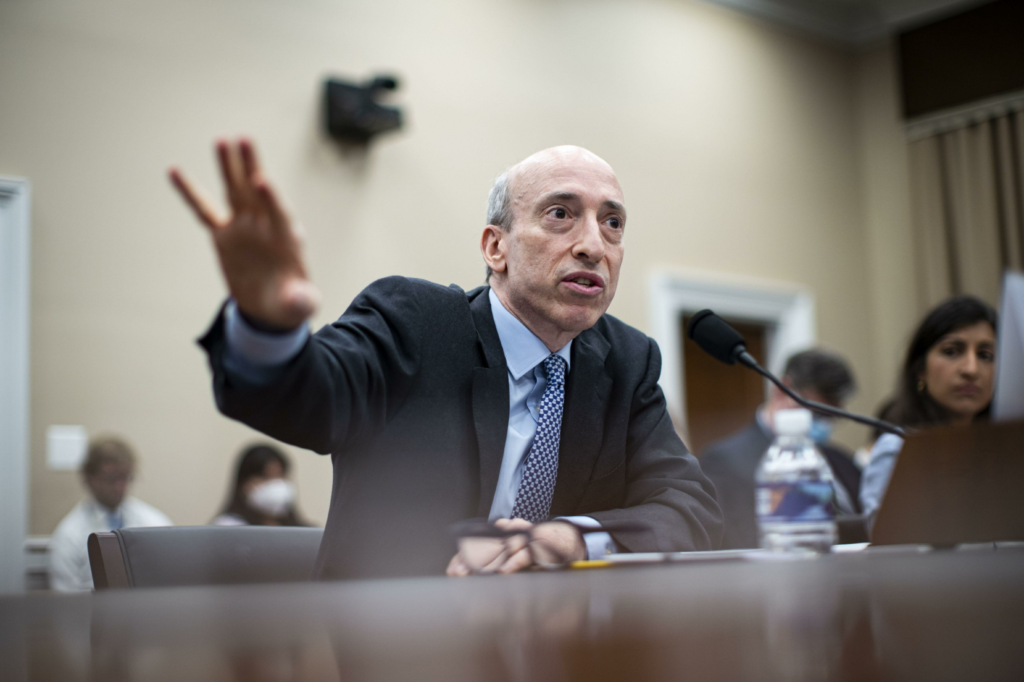Securities and Exchange Commission chairman Gary Gensler has implied that bitcoin is the only cryptocurrency that he firmly believes is a commodity, not a security.
For the past five years, cryptocurrency entrepreneurs have been in fierce disagreement with U.S. regulators over an existential question: whether certain digital assets are securities, or investment contracts that need to be registered with the Securities and Exchange Commission. The stakes are high—if a cryptocurrency is deemed a security in a U.S. court, it basically dies in the American crypto ecosystem. That’s because it can’t currently be traded on any cryptocurrency exchange, since none of them has a national securities exchange license.
Two weeks ago, the SEC filed a complaint in federal court asserting that nine tokens available to trade on Coinbase were securities, and the decree initially sounded like a step toward more regulatory clarity. But the SEC didn’t explain what makes the tokens different from other cryptocurrencies, and after the complaint came out, Coinbase published a blog post titled, “Coinbase Does Not List Securities. End of Story.” The episode was just the latest sign that the gap between the industry and regulators has never been bigger.
“The SEC chairman has publicly asserted that digital assets other than bitcoin are securities,” says Jai Massari, a former partner at law firm Davis Polk and now chief legal officer at blockchain startup Lightspark. Yet crypto companies have “necessarily taken the position that digital assets are generally not securities,” she says. It’s a stunning place for an industry to be, with near 100% disagreement between regulators and companies on a foundational question. “How this plays out in the coming months will shape the future of much of the existing crypto industry,” Massari says.
Until now, the SEC has kept an arm’s-length distance from defining which cryptocurrencies are securities, providing ambiguous guidance in public and private meetings with companies, according to securities lawyers Forbes spoke with. In its recent claim that nine Coinbase-listed tokens are securities, it invoked a set of guidelines called the Howey Test to make its argument. But the test is too vague and malleable to produce clear results, Massari and Davis Polk partner Joe Hall have written. Meanwhile, the cryptocurrency industry has kept marching forward with the implicit belief that few digital assets are securities.
In January 2021, when President Biden selected Gary Gensler as the new chairman of the SEC, many in the industry pointed out that Gensler had taught a blockchain course at MIT and hoped he’d provide more regulatory clarity on which digital assets are securities. But that hasn’t happened, and it’s largely because of the political muck Gensler would find himself in if he did so, says Joe Hall, who has been a Davis Polk partner for 23 years and working on crypto regulation since 2013.
“When there’s a trillion-dollar market, any SEC chairman has to know that if he or she wades into that, it can be completely consuming and put them in the middle of a food fight between traditional financial services and crypto companies. Those are the worst kinds of fights to be in,” he says. “You have vested interests on both sides. It can consume an incredible amount of time and resources . . . you have to deal with your overlords on Capitol Hill.”
The “Pottery Barn rule”—a principle of “You break it, you buy it”—also exacerbates the situation for regulators. If the SEC says a certain cryptocurrency isn’t a security, it’s treated like an endorsement, attorneys say. Later on, if something goes awry with the asset and consumers lose a lot of money, Gensler will be heavily criticized by congressional oversight committees and the media, according to Hall.
“It’s easy to criticize the SEC from the outside,” Hall adds. “But I know exactly why they’re doing it. There is just no benefit from the point of view of an individual to stick your neck out and actually try to solve the problem. It’s much easier to bring enforcement actions against people for violating the laws.” An SEC spokesperson declined to comment for this article.
As crypto companies keep operating despite the risk of SEC enforcement actions, Hall doesn’t think those businesses are acting naively, or that they believe they can safely ignore what the SEC is doing. For better or worse, they’re just moving ahead despite the risks and uncertainty. “If you weren’t willing to live with regulatory uncertainty, there’s just no way you could operate in the business,” he says.
More recently, crypto companies have developed the financial strength and confidence to go head to head with the SEC. In late June, crypto asset manager Grayscale sued the SEC for failing to allow the company to convert the Grayscale Bitcoin Trust (GBTC), a bitcoin-based investment vehicle that it released in 2013, into a spot bitcoin exchange-traded fund (ETF), which would make the investment more accessible to the average U.S. investor.
How will the fundamental disagreement between regulators and the industry get resolved? “There’s no point in hoping that anyone at the SEC or a change in guard will result in the cavalry riding in,” Hall says. “We really need to turn to Congress to solve it.”
Author
Administraroot


